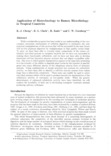Application of Biotechnology to Rumen Microbiology in Tropical Countries
Tropical agriculture research series : proceedings of a symposium on tropical agriculture researches
| ISSN | 03889386 |
|---|---|
| NII recode ID (NCID) | AA00870529 |

Full text
tars25-_155-161.pdf1.41 MB
While considerable progress has been made in our understanding of the very complex enzymatic mechanisms of cellulose digestion in ruminants, the only practical manipulations of this process that will be successful in the near future will involve β-glucan digestion by endoglucanase in high quality cereal feeds. To date, we have been able to transfer many components of the rumen cellulolytic microbial genome to recipient bacteria but we have not succeeded in making them functionally cellulolytic, and we have not been able to develop functional cell-free bacterial enzyme systems that can digest crystalline cellulose. One area in which genetic manipulation appears to be especially promising is in the transfer of the ability to degrade plant toxins by the transfer of specific genes into many different species of the ubiquitous natural flora of domestic animals. Using combinations of simple practical test systems for cellulolytic activity, we have been able to identify a cell-free enzyme system from rumen fungi that is effectively cellulolytic. These tests can readily be used to select microbial isolates which will be used to produce inocula for manipulation of the cellulolytic activity of ruminants on low-quality feeds. When the genetic determinants of enhanced cellulolytic activity have been identified, we will explore the feasibility of their use in developing transgenic ruminant animals producing salivary cellulases.
| Date of issued | |
|---|---|
| Creator | K.-J. Cheng R. G. Clark H. Kudo C. W. Forsberg |
| Publisher | Japan International Research Center for Agricultural Sciences |
| Volume | 25 |
| spage | 155 |
| epage | 161 |
| Language | eng |
